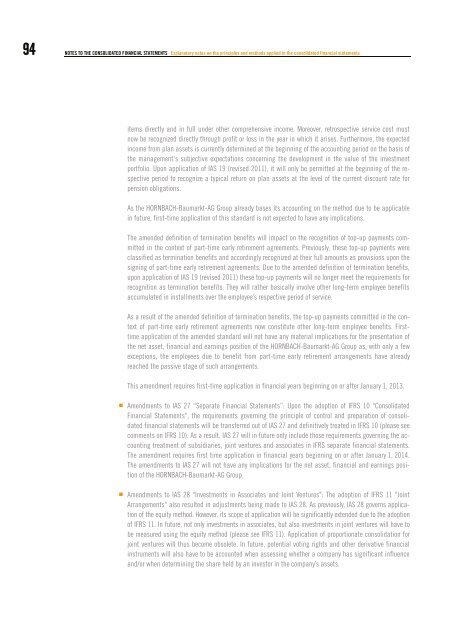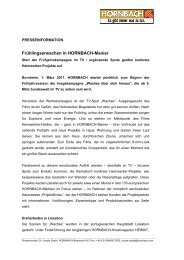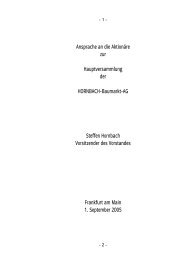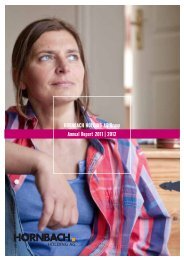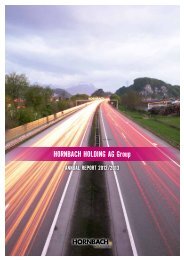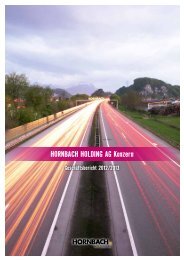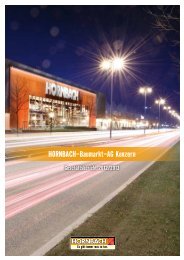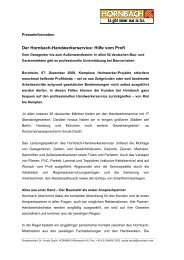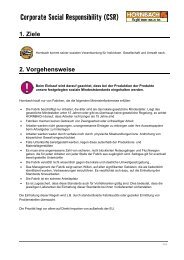Hornbach-Baumarkt-AG Group
PDF, 3,6 MB - Hornbach Holding AG
PDF, 3,6 MB - Hornbach Holding AG
- No tags were found...
Create successful ePaper yourself
Turn your PDF publications into a flip-book with our unique Google optimized e-Paper software.
94 NOTES TO THE CONSOLIDATED FINANCIAL STATEMENTS Explanatory notes on the principles and methods applied in the consolidated financial statements<br />
items directly and in full under other comprehensive income. Moreover, retrospective service cost must<br />
now be recognized directly through profit or loss in the year in which it arises. Furthermore, the expected<br />
income from plan assets is currently determined at the beginning of the accounting period on the basis of<br />
the management's subjective expectations concerning the development in the value of the investment<br />
portfolio. Upon application of IAS 19 (revised 2011), it will only be permitted at the beginning of the respective<br />
period to recognize a typical return on plan assets at the level of the current discount rate for<br />
pension obligations.<br />
As the HORNBACH-<strong>Baumarkt</strong>-<strong>AG</strong> <strong>Group</strong> already bases its accounting on the method due to be applicable<br />
in future, first-time application of this standard is not expected to have any implications.<br />
The amended definition of termination benefits will impact on the recognition of top-up payments committed<br />
in the context of part-time early retirement agreements. Previously, these top-up payments were<br />
classified as termination benefits and accordingly recognized at their full amounts as provisions upon the<br />
signing of part-time early retirement agreements. Due to the amended definition of termination benefits,<br />
upon application of IAS 19 (revised 2011) these top-up payments will no longer meet the requirements for<br />
recognition as termination benefits. They will rather basically involve other long-term employee benefits<br />
accumulated in installments over the employee’s respective period of service.<br />
As a result of the amended definition of termination benefits, the top-up payments committed in the context<br />
of part-time early retirement agreements now constitute other long-term employee benefits. Firsttime<br />
application of the amended standard will not have any material implications for the presentation of<br />
the net asset, financial and earnings position of the HORNBACH-<strong>Baumarkt</strong>-<strong>AG</strong> <strong>Group</strong> as, with only a few<br />
exceptions, the employees due to benefit from part-time early retirement arrangements have already<br />
reached the passive stage of such arrangements.<br />
This amendment requires first-time application in financial years beginning on or after January 1, 2013.<br />
• Amendments to IAS 27 “Separate Financial Statements”: Upon the adoption of IFRS 10 "Consolidated<br />
Financial Statements", the requirements governing the principle of control and preparation of consolidated<br />
financial statements will be transferred out of IAS 27 and definitively treated in IFRS 10 (please see<br />
comments on IFRS 10). As a result, IAS 27 will in future only include those requirements governing the accounting<br />
treatment of subsidiaries, joint ventures and associates in IFRS separate financial statements.<br />
The amendment requires first time application in financial years beginning on or after January 1, 2014.<br />
The amendments to IAS 27 will not have any implications for the net asset, financial and earnings position<br />
of the HORNBACH-<strong>Baumarkt</strong>-<strong>AG</strong> <strong>Group</strong>.<br />
• Amendments to IAS 28 "Investments in Associates and Joint Ventures": The adoption of IFRS 11 "Joint<br />
Arrangements" also resulted in adjustments being made to IAS 28. As previously, IAS 28 governs application<br />
of the equity method. However, its scope of application will be significantly extended due to the adoption<br />
of IFRS 11. In future, not only investments in associates, but also investments in joint ventures will have to<br />
be measured using the equity method (please see IFRS 11). Application of proportionate consolidation for<br />
joint ventures will thus become obsolete. In future, potential voting rights and other derivative financial<br />
instruments will also have to be accounted when assessing whether a company has significant influence<br />
and/or when determining the share held by an investor in the company’s assets.


